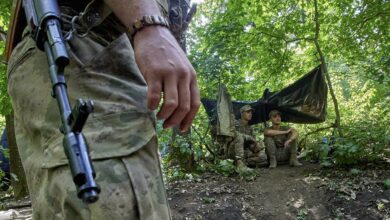Mykola, one of thousands of Ukrainian soldiers laid to rest in Dnipro

By Lourdes Velasco
Dnipro, Ukraine, May 5 (EFE).- At the military cemetery in Dnipro, eastern Ukraine, Victoria and her family have come to bid farewell to her late husband Mykola, who was killed by shelling in the region of Donetsk aged 44.
Ukrainian flags fly over the country’s cemeteries in honor of fallen soldiers, whose numbers since Russia’s invasion are estimated between 2,500 to 3,000, according to president Volodymyr Zelenskyy last month.
Victoria holds on tightly to the yellow and blue Ukrainian national flag that was draped over her husband’s coffin during the funeral ceremony.
“I kept it so that his children would know their father defended his family and country until the end,” she tells Efe.
Mykola had worked in a factory before joining the military in 2014, the year Russia annexed Crimea and pro-Russian insurgents seized power over swathes of the eastern Donbas region leading to a bloody war.
“He decided he had to look after his country,” his wife said.
Mykola was called up on three occasions, in 2014, 2017 and during Russia’s invasion of Ukraine this year.
“We didn’t hear anything from him for two weeks. He didn’t pick up the phone and didn’t call us,” Victoria says. “Eventually the central command informed us. We couldn’t believe it but we went to the morgue and saw that it was true. He had three children and was the only son of his mother.”
The man leading the funeral service is Dimitro Povorotnei, an Orthodox priest assigned to the Ukrainian military in the Dnipro region.
He tells Efe that over 200 soldiers have been buried in the region in the last month, including many whose identities were unknown.
Mykola’s funeral is attended by around a dozen of his comrades, a group of musicians and his mother, who sits on a bench behind the coffin, dressed in black.
As the priest performs his blessing, she approaches the casket to kiss her son farewell one last time.
Some 2,500 soldiers killed in action since 2014 are interred at the Dnipro cemetery.
“It’s very difficult to control your emotions,” the priest says. “We have to pay this price to be free and independent. We are very conscious of what we are doing, we are giving our lives for Ukraine to be free and for a better future.”
The priest holds military funerals twice a week, on Mondays and Wednesdays.
At the next funeral, Povorotnei will conduct the direct burial of 25 men, some of whom hailed from Dnipro itself while others were born further afield in towns in the adjoining region of Zaporizhzhia that are now occupied by Russian forces.
“The war is not only fought on the ground but in the mind. The Russian world has its own religion and its prophet is Putin. They are the devil, they have no spirituality, they are devils,” the military priest tells Efe.
Mykola’s body is covered by a white sheet during the open casket ceremony, although his face and military boots are clearly visible.
His youngest children, aged two and four, do not fully grasp the situation, but his eldest, who is 10, does.





